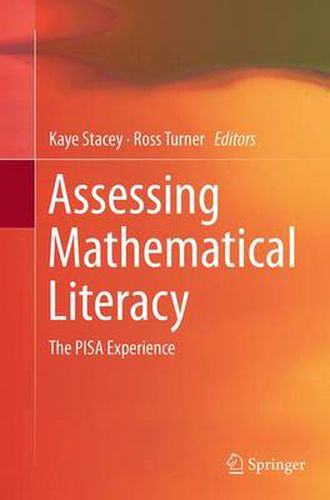Readings Newsletter
Become a Readings Member to make your shopping experience even easier.
Sign in or sign up for free!
You’re not far away from qualifying for FREE standard shipping within Australia
You’ve qualified for FREE standard shipping within Australia
The cart is loading…






This title is printed to order. This book may have been self-published. If so, we cannot guarantee the quality of the content. In the main most books will have gone through the editing process however some may not. We therefore suggest that you be aware of this before ordering this book. If in doubt check either the author or publisher’s details as we are unable to accept any returns unless they are faulty. Please contact us if you have any questions.
This book describes the design, development, delivery and impact of the mathematics assessment for the OECD Programme for International Student Assessment (PISA). First, the origins of PISA’s concept of mathematical literacy are discussed, highlighting the underlying themes of mathematics as preparation for life after school and mathematical modelling of the real world, and clarifying PISA’s position within this part of the mathematics education territory. The PISA mathematics framework is introduced as a significant milestone in the development and dissemination of these ideas. The underlying mathematical competencies on which mathematical literacy so strongly depends are described, along with a scheme to use them in item creation and analysis. The development and implementation of the PISA survey and the consequences for the outcomes are thoroughly discussed. Different kinds of items for both paper-based and computer-based PISA surveys are exemplified by many publicly released items along with details of scoring. The novel survey of the opportunity students have had to learn the mathematics promoted through PISA is explained. The book concludes by surveying international impact. It presents viewpoints of mathematics educators on how PISA and its constituent ideas and methods have influenced teaching and learning practices, curriculum arrangements, assessment practices, and the educational debate more generally in fourteen countries.
$9.00 standard shipping within Australia
FREE standard shipping within Australia for orders over $100.00
Express & International shipping calculated at checkout
This title is printed to order. This book may have been self-published. If so, we cannot guarantee the quality of the content. In the main most books will have gone through the editing process however some may not. We therefore suggest that you be aware of this before ordering this book. If in doubt check either the author or publisher’s details as we are unable to accept any returns unless they are faulty. Please contact us if you have any questions.
This book describes the design, development, delivery and impact of the mathematics assessment for the OECD Programme for International Student Assessment (PISA). First, the origins of PISA’s concept of mathematical literacy are discussed, highlighting the underlying themes of mathematics as preparation for life after school and mathematical modelling of the real world, and clarifying PISA’s position within this part of the mathematics education territory. The PISA mathematics framework is introduced as a significant milestone in the development and dissemination of these ideas. The underlying mathematical competencies on which mathematical literacy so strongly depends are described, along with a scheme to use them in item creation and analysis. The development and implementation of the PISA survey and the consequences for the outcomes are thoroughly discussed. Different kinds of items for both paper-based and computer-based PISA surveys are exemplified by many publicly released items along with details of scoring. The novel survey of the opportunity students have had to learn the mathematics promoted through PISA is explained. The book concludes by surveying international impact. It presents viewpoints of mathematics educators on how PISA and its constituent ideas and methods have influenced teaching and learning practices, curriculum arrangements, assessment practices, and the educational debate more generally in fourteen countries.